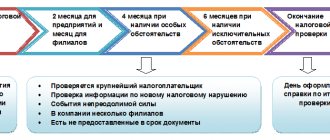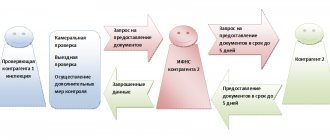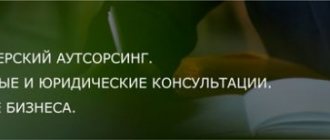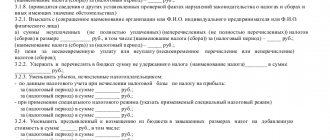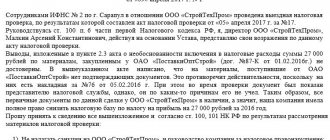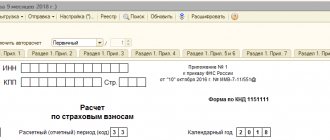Tax authorities, within their competence, are authorized to carry out tax control activities such as inspection. Inspection of premises (territories), documents and objects is a tax control measure that is carried out as part of tax audits.
This article will answer questions that entrepreneurs usually have during inspections by the tax service..
Tax inspectors inspect production, warehouse, retail and any other premises and territories that an organization or individual entrepreneur uses to generate income (clause 6, clause 1, article 31 of the Tax Code of the Russian Federation). Inspectors also have the right to inspect documents and items, including taxable items, belonging to an organization or individual entrepreneur (Clause 2 of Article 91, Article 92 of the Tax Code of the Russian Federation).
For the purpose of conducting an inspection, the tax authority requires access to the territory or premises of the taxpayer.
The Tax Code of the Russian Federation does not establish special rules for conducting inspections. The results of the inspection are documented in a protocol. (Clause 2, Clause 5 of Article 92 of the Tax Code of the Russian Federation). The form of the protocol for the inspection of territories, premises, documents, objects is given in Appendix No. 16 to the Order of the Federal Tax Service of Russia dated November 7, 2018 N ММВ-7-2/ [email protected]
The inspection protocol for premises, territories, documents and objects must comply with the general requirements established in Art. 99 Tax Code of the Russian Federation:
- The protocol is drawn up in Russian (clause 1 of article 99 of the Tax Code of the Russian Federation).
- The protocol indicates (clause 2 of article 99 of the Tax Code of the Russian Federation):
- its name;
- place and date of drawing up the protocol;
- start and end times of the inspection;
- position, surname, name, patronymic of the person who compiled the protocol;
- information about the persons who participated in the inspection;
- information about the objects of inspection and their location;
- a detailed description of the inspection results.
The protocol is signed by all persons who took part in the inspection. In this case, the taxpayer (his representative), witnesses and present specialists can enter into the protocol or attach their comments to it (clause 3 of Article 99 of the Tax Code of the Russian Federation). If necessary, during the inspection, photography, filming, video recording are carried out, copies of documents are taken, or other actions are taken (clause 4 of Article 92 of the Tax Code of the Russian Federation). At the same time, according to clause 5 of Art. 99 of the Tax Code of the Russian Federation, photographic photographs and negatives, films, videos and other materials obtained during the inspection are attached to the protocol.
Inspection of premises and territories, documents and objects is carried out on the basis of a reasoned resolution of the head (deputy head) of the tax inspectorate conducting the inspection. An inspector and witnesses must participate in the inspection. Any uninterested persons of at least two people may be invited as witnesses. Employees of tax authorities and other persons interested in any way cannot be witnesses.
Tax authorities can conduct inspections:
- during an on-site tax audit;
- during a desk tax audit for VAT;
- outside the scope of a tax audit;
- if there is arrears exceeding 1 million rubles.
Let's consider each case in detail.
What premises are being inspected?
Tax inspectors have the right to inspect the premises (territories) of an organization during an on-site tax audit, as well as during a desk audit of a VAT declaration (subclause 6, clause 1, article 31, clause 1, article 82, clause 13, article 89, p. 2, Article 91, Article 92 of the Tax Code of the Russian Federation).
Tax inspectors will definitely conduct an inspection if they have the following data:
– the organization received inventory items, but did not reflect them in accounting;
– the organization has capacities and resources that it uses in activities not stated in the constituent documents;
– the organization did not report or reflected in an underestimated amount the revenue from the sale of manufactured products.
This is stated in paragraph 6.5 of the letter of the Federal Tax Service of Russia dated July 17, 2013 No. AS-4-2/12837.
Production, warehouse, retail and any other premises and territories that the organization uses in its activities are subject to inspection (subclause 6, clause 1, article 31, clause 13, article 89 of the Tax Code of the Russian Federation). At the same time, inspection access to residential premises without the consent of residents is prohibited. The exception is cases when the inspection is granted such access on the basis of federal laws or a court decision (Clause 5 of Article 91 of the Tax Code of the Russian Federation).
For more information on the legality of conducting inspections of premises (territories) during desk tax audits, see What powers does the tax inspectorate have during desk audits.
Interrogations and inspections within the framework of tax control
Recently, tax authorities have increasingly used tax control procedures such as:
—
interrogation of employees, as well as managers and founders of the organization;
—
inspection of premises and territories.
An interview with an expert, Sergei Razgulin, active state adviser of the Russian Federation, 3rd class, is devoted to certain issues regarding the conduct of these events, the rights and responsibilities of their participants.
How can a tax authority request information from individuals of the taxpayer being audited?
The Tax Code of the Russian Federation provides for several forms of requesting information.
A requirement to provide explanations, a summons to summon a witness for questioning, a notice of summons to the tax authority, a requirement to submit documents (information) are different documents that have independent grounds for sending and, accordingly, the consequences of their failure to comply.
In addition, some of these documents are addressed to the organization as a taxpayer, and some are targeted in nature and relate to specific individuals.
What is the procedure for summoning an individual for questioning to the tax authority?
According to paragraph 1 of Article 90 of the Tax Code of the Russian Federation, any individual who may be aware of any circumstances relevant to the implementation of tax control can be called as a witness to testify.
The Tax Code of the Russian Federation does not regulate the procedure for summoning a tax authority to give evidence.
Clause 5.1 of the Federal Tax Service letter No. AS-4-2/12837 dated July 17, 2013, tax authorities are focused on summoning a witness to testify at the location (premises) of the tax authority by subpoena.
The interrogation of a witness at the tax office may be carried out, including during the suspension of an on-site tax audit.
Moreover, in accordance with paragraph 4 of Article 90 of the Tax Code of the Russian Federation, at the discretion of a tax authority official, testimony can be obtained at the place of residence of the witness.
Appendix No. 11 to the Order of the Federal Tax Service dated May 8, 2015 No. ММВ-7-2/ [email protected] contains the form of the protocol for the interrogation of a witness, which, among other things, reflects the address of the place of interrogation.
Thus, in the case of an interrogation at the location of the taxpayer being inspected, drawing up a document calling his representatives - individuals - as witnesses to the tax authority is not required.
If the general director is unable, for objective reasons, to come for questioning, can another person appear instead by proxy?
A taxpayer may participate in relations regulated by the legislation on taxes and fees through an authorized representative (clause 1 of Article 26 of the Tax Code of the Russian Federation).
It should be noted that when an employee or other official of an organization is called to the tax authority, participation in the interrogation procedure of their representative is possible if they have a power of attorney issued on behalf of individuals. A power of attorney issued by an organization is not the basis for representing the interests of its employees.
In addition, the participation of a representative does not relieve one from duties in respect of which personal (independent) performance is provided, in particular, the presentation of testimony and explanations cannot be entrusted to the representative.
Thus, the participation of, for example, a lawyer does not relieve an individual from the obligation to personally comply with a notification (summons) from the tax authority to give explanations (testimonies).
If for objective reasons it is impossible to arrive for questioning, the tax authority should be notified about this.
Can a representative of the organization - a staff lawyer - be present during the interrogation of its employee?
The Tax Code of the Russian Federation does not provide for the right of the person being inspected to participate in the interrogation of witnesses (letter of the Ministry of Finance dated October 22, 2015 No. 03-02-07/1/60796). This statement should be understood in such a way that such a right to participate in this tax control event is not provided as a separate right of the audited taxpayer.
But participation can be realized by issuing a power of attorney to an authorized representative of the employee (naturally, with the consent of the witness expressed in the corresponding power of attorney).
What liability is provided for by the Tax Code of the Russian Federation for a witness?
Liability for failure to comply with a notice (summons) depends on the status in which the individual was called to give explanations (testimony).
An individual has the right to refuse to testify only on the grounds provided for by law (clause 3 of Article 90 of the Tax Code of the Russian Federation).
The Tax Code of the Russian Federation establishes the liability of a witness for failure to appear or evasion of appearance, as well as for unlawful refusal to testify or for giving knowingly false testimony (Article 128 of the Tax Code of the Russian Federation).
For example, a witness’s unlawful refusal to testify entails a fine of three thousand rubles (Article 128 of the Tax Code of the Russian Federation).
Can the director be questioned as a witness?
The Federal Tax Service in paragraph 5.1 of letter No. AS-4-2/12837 dated July 17, 2013 recommends qualifying the protocol of interrogation of the director, chief accountant of the taxpayer being audited, interviewed as witnesses and obviously interested in the outcome of the case, as a document that documents the taxpayer’s explanations (subparagraph 4 of paragraph 1 Article 31 of the Tax Code of the Russian Federation).
Tax legislation does not provide for liability of an individual summoned to give explanations for refusal to give explanations. At the same time, administrative liability may be applied for failure to appear to give explanations as for disobedience to a legal requirement of a tax authority official (Article 19.4 of the Code of the Russian Federation on Administrative Offences).
What legal act regulates the duration of interrogation?
In the Tax Code of the Russian Federation, unlike the Criminal Procedure Code of the Russian Federation, there is no regulation of the duration of interrogation.
In accordance with Article 187 of the Criminal Procedure Code of the Russian Federation, interrogation cannot last continuously for more than four hours. Continuation of the interrogation is allowed after a break of at least one hour for rest and eating, and the total duration of the interrogation during the day should not exceed eight hours.
At the same time, according to Article 2 of the Tax Code of the Russian Federation, the legislation on taxes and fees regulates, among other things, relations arising in the process of tax control. By virtue of paragraph 3 of Article 33 of the Tax Code of the Russian Federation, tax officials are obliged to treat taxpayers, their representatives and other participants in relations regulated by the legislation on taxes and fees correctly and carefully, and not to humiliate their honor and dignity.
During the interrogation, the witness has the right to submit a request to the tax authority officials for the need to provide a break if the duration of the interrogation exceeded four hours, as well as for other valid reasons, for example, due to poor health. In addition, the witness may ask to reschedule the interrogation (to conduct a new interrogation on another day). The witness has the right to demand that the relevant statements be reflected in the interrogation protocol.
A person is considered innocent of committing a tax offense until his guilt is proven in the manner prescribed by federal law (clause 6 of Article 108 of the Tax Code of the Russian Federation). When considering issues of holding a taxpayer accountable for committing a tax offense, the use of evidence obtained in violation of the Tax Code of the Russian Federation is not allowed (clause 4 of Article 101, clause 7 of Article 101.4 of the Tax Code of the Russian Federation).
When considering the materials of a tax audit, the taxpayer has the right to demand that the testimony of a witness obtained during an interrogation that lasted more than four hours be excluded from evidence as obtained in violation of the law, provided that the interrogation protocol reflected the witness’s statements about the need for a break.
How should the audited taxpayer perceive the results of the interrogations of witnesses conducted by the tax authority?
It is necessary to carefully study the protocol of interrogation of witnesses. It is possible to cast doubt on the testimony about a transaction with the taxpayer being audited by those witnesses whose job responsibilities did not include the conclusion of the transaction or the execution of the transaction (“the witness speaks about what he cannot know”).
Often, when a tax authority official formulates entries in the protocol (“abbreviation of what was said”), the meaning of the testimony is distorted.
Note!
The inspection report must be accompanied by protocols of interrogation of all witnesses, and not just those whose testimony confirms the position of the tax authority.
When does the tax authority have the right to conduct an inspection?
Within the framework of on-site, desk tax audits and outside the scope of audits.
Access to the territory or premises of the taxpayer being inspected by tax officials directly conducting the tax audit is carried out:
—
upon presentation by these officials of official identification and a decision of the head (his deputy) of the tax authority to conduct an on-site tax audit of this person;
—
upon presentation of service certificates and a reasoned resolution of an official of the tax authority carrying out a desk tax audit on the basis of a tax return for value added tax, to conduct an inspection in the cases provided for in paragraphs 8 and 8.1 of Article 88 of the Tax Code of the Russian Federation. The specified resolution is subject to approval by the head (deputy head) of the tax authority (clause 1 of Article 91 of the Tax Code of the Russian Federation).
Inspection of documents and objects on the territory or premises of the taxpayer is possible outside the framework of tax audits with the consent of the taxpayer to conduct such an inspection.
Is the tax authority required to notify the taxpayer in advance to conduct an inspection of the territory?
Tax authorities, in the manner prescribed by Article 92 of the Tax Code of the Russian Federation, have the right to inspect any production, warehouse, trading and other premises and territories used by the taxpayer for generating income or related to the maintenance of taxable objects, regardless of their location (subparagraph 6 of paragraph 1 of Article 31 of the Tax Code of the Russian Federation) .
For the purpose of conducting an inspection, the tax authority requires access to the territory or premises of the taxpayer. The tax authority must notify the taxpayer in any form about the upcoming inspection.
This notice may be given in person, by registered mail with return receipt requested, electronically via telecommunications channels, or by telephone message, telegram, or fax. If the tax authority has evidence of such a notice, the taxpayer’s rights to participate in the inspection are not considered violated.
On the other hand, the notification period for the upcoming inspection of the Tax Code of the Russian Federation has not been established.
Therefore, a taxpayer who has been presented with the documents specified in paragraph 1 of Article 91 of the Tax Code of the Russian Federation does not have the right to prohibit the inspection.
Obstructing the access of officials to the territory or premises of a taxpayer consists of illegally denying access to an official of the tax authority conducting a tax audit to inspect production, warehouse, trading and other premises and territories used by the taxpayer to generate income or related to the maintenance of taxable objects. This entails liability under Article 19.7.6 of the Code of the Russian Federation on Administrative Offenses in the form of a fine of 10 thousand rubles. Subclause 7 of clause 1 of Article 31 of the Tax Code of the Russian Federation gives in this case the tax authority the right to calculate taxes payable by the taxpayer by calculation.
Failure to notify the taxpayer about the inspection does not violate his rights if he actually took part in the inspection.
What if there was no notification and the taxpayer’s representative did not take part in the inspection for this reason?
The use of evidence obtained in violation of the Tax Code of the Russian Federation is not allowed (clause 4 of Article 101 of the Tax Code of the Russian Federation).
The absence of a taxpayer during the inspection, because he was not notified of the inspection, is a violation of his rights. This may entail the cancellation of the decision (the corresponding part of the decision) made by the tax authority based on the results of consideration of the tax audit materials (clause 14 of Article 101 of the Tax Code of the Russian Federation).
Cancellation of the decision (the corresponding part of the decision) is possible if the tax authority or the court considers that the taxpayer’s absence during the inspection led to a significant violation of his rights to defense (it did not allow comments to be made on the inspection protocol on the circumstances that served as the basis for the adoption of the appealed inspection decision).
On the other hand, is it necessary for representatives of the taxpayer being inspected to participate in the inspection?
The person subject to a tax audit, or his representative, has the right to participate in the inspection (clause 3 of Article 92 of the Tax Code of the Russian Federation).
Information about the participation of the person being inspected in the inspection is reflected in the inspection report. The form of the protocol for the inspection of territories, premises, documents, objects is given in Appendix No. 14 to the Order of the Federal Tax Service dated 05/08/2015 No. ММВ-7-2 / [email protected]
Taking into account the above provisions, we can conclude that the Taxpayer’s mandatory participation in the inspection is not provided for by the Tax Code of the Russian Federation.
The inspection may be carried out either in the presence of a representative of the taxpayer, or in the absence of the taxpayer (his representative), subject to prior notification of the taxpayer about the upcoming inspection.
Can video recording be carried out during the inspection?
Yes, the right of inspectors to take photographs is directly provided for in paragraph 4 of Article 92 of the Tax Code of the Russian Federation. The resulting record in the form of a tangible medium is attached to the inspection report.
Is it necessary to take into account the taxpayer's working hours when conducting an inspection? What to do if the tax authority conducts an inspection, but staff working hours are running out?
According to Article 103 of the Tax Code of the Russian Federation, when conducting tax control, it is not allowed to cause unlawful harm to the persons being inspected, their representatives or property in their possession, use or disposal.
As a general rule, all tax control activities are carried out during business hours. Conducting an inspection outside of working hours, determined in accordance with internal labor regulations, may be considered a violation of the rights of the taxpayer, and the taxpayer’s refusal to conduct such an inspection is not contrary to the law. In such a situation, the inspection may be postponed by the tax authority to another day.
It seems that the end of the inspection outside working hours, determined in accordance with the internal labor regulations of the taxpayer, is not in itself a circumstance entailing the inadmissibility of using evidence obtained by the tax authority during such an inspection.
If the taxpayer’s representatives did not object to the extension of the inspection beyond the working hours established for the taxpayer and did not reflect the corresponding comments in the inspection protocol, then subsequently, for the purpose of excluding the inspection protocol from evidence of a tax offense, the taxpayer must cite other violations by the tax authority of the taxpayer’s rights during the inspection (for example, lack of witnesses).
tax reporting tax audit
Send
Stammer
Tweet
Share
Share
Reason for inspection
To conduct an inspection of premises and territories during an on-site tax audit, you do not need to issue a special decision from the inspectorate. To gain access to the territory or premises of the inspected organization, the inspectorate employees directly conducting the tax audit need only present their official IDs and the decision to conduct an on-site audit.
If inspectors decide to conduct an inspection as part of a desk audit of a VAT return, then in addition to their official identification documents, they are required to present a special document - a reasoned resolution. This resolution must be approved by the head (deputy) of the inspection.
This follows from the provisions of paragraph 1 of Article 91 of the Tax Code of the Russian Federation.
In this case, the tax authority has the right:
- request documents necessary for verification;
- inspect the property of the inspected individual located in his non-residential premises;
- interrogate as witnesses individuals who may be aware of any circumstances relevant to tax control;
- attract specialists and experts;
- request from persons who have documents (information) relating to the activities of the individual being inspected, these documents or information.
WHEN CAN A TAX AUDIT COME TO YOU?
Inspection Notice
Situation: is the inspection obliged to notify the organization about the time and place of the inspection?
On the one hand, the Tax Code does not provide for a requirement for the inspection to notify the organization about the time and place of the inspection (Article 92 of the Tax Code of the Russian Federation).
On the other hand, representatives of the inspected organization have the right to participate in the inspection (clause 3 of Article 92 of the Tax Code of the Russian Federation). But in order to exercise this right in practice, the organization must be notified of the time and place of the inspection. Based on this, we can conclude that the inspection is still obliged to notify the organization about the time and place of the inspection. In arbitration practice there are examples of court decisions that confirm the legitimacy of this conclusion (see, for example, the resolution of the Federal Antimonopoly Service of the Moscow District dated August 19, 2009 No. KA-A41/8084-09, the Central District dated July 11, 2008 No. A64-6856 /07-19).
Do tax officials have the right to inspect programs installed on a taxpayer’s computer?
An inspection of a personal computer includes an inspection of the software installed on it, since due to its functional purpose, only in this way can it be established what tasks this personal computer solves, as well as determine what technological and software processes were carried out by the taxpayer on this equipment.
As the senior judges indicated, the inspection provided for in Article 92 of the Tax Code of the Russian Federation, as one of the actions carried out by the tax authority in order to clarify circumstances relevant to the completeness of the audit, involves the detection, visual perception and direct examination of material objects containing information. Since information can be contained not only on paper, but also be presented in electronic digital form and contained in an automated data storage system, conducting an inspection without studying the data contained in the computer would not meet the purpose of its implementation, since the computer itself, as a technical device, does not carry information.
Important!
Therefore, the judges came to the conclusion that the actions of the tax authorities regarding the inspection of computer software were legal (Determination of the Supreme Court of the Russian Federation dated July 17, 2017 No. 302-KG17-8315).
Denial of access to inspectors
If during an inspection (on-site or desk for VAT) an organization prevents inspection employees from accessing its territories and premises (with the exception of residential premises), the head of the inspection team draws up a report on this in the form approved by order of the Federal Tax Service of Russia dated March 6, 2007 No. MM -3-06/106. The act must be signed on both sides: by the head of the inspection team and by a representative of the organization being inspected. If a representative of the organization refuses to sign the act, the head of the inspection group will make an appropriate entry about this in the act. This follows from the provisions of paragraph 3 of Article 91 of the Tax Code of the Russian Federation.
In addition, the inspection will have the right to independently determine the amount of tax to be paid (paragraph 2, paragraph 3, article 91 of the Tax Code of the Russian Federation). In this case, in its calculations, the inspection will not rely on the actual data that it could obtain during the inspection, but on other information available to it. For example, the inspection may use information obtained from other organizations similar to the one being inspected. This follows from the provisions of paragraph 2 of paragraph 3 of Article 91 of the Tax Code of the Russian Federation.
The tax inspectorate also has the right to fine the organization and its officials.
Removal of documents and objects
The functional essence of seizure involves the forced removal of relevant objects - information carriers.
The reasons for carrying out a seizure in the Tax Code are:
- refusal of the inspected person to whom the request is sent to submit the requested documents;
- failure to submit requested documents within the established time frame.
The reasons for the seizure of documents in the Tax Code are: - whether the officials carrying out the inspection have sufficient grounds to believe that documents evidencing the commission of offenses may be destroyed, hidden, altered or replaced;
- refusal of the taxpayer, fee payer or tax agent to submit documents requested during a tax audit or failure to submit them within the established time frame.
Two categories of documents are subject to seizure:
- evidence of the commission of offenses;
- requested from the person being inspected, but not provided by him within the established time frame.
Documents and items not related to the subject of the inspection cannot be seized during the seizure.
Seizure of original documents may be carried out subject to the following conditions:
- To carry out control activities, it is not enough to seize copies of documents of the person being inspected;
- the inspectors have reasonable grounds to believe that the original documents will be destroyed, hidden, corrected or replaced.
Based on the results of the seizure of documents and objects, a corresponding protocol is drawn up.
Participants of the inspection
Inspection of premises and territories during a tax audit (on-site or desk for VAT) must be carried out by inspection staff in the presence of witnesses (clause 3 of Article 92 of the Tax Code of the Russian Federation). Their presence is necessary to confirm the content and results of the inspection, as well as the facts revealed during the inspection (clause 5 of Article 98 of the Tax Code of the Russian Federation). Inspectors can invite any uninterested persons as witnesses (clause 2 of Article 98 of the Tax Code of the Russian Federation). For example, inspectors do not have the right to involve other inspection employees as witnesses (clause 4 of Article 98 of the Tax Code of the Russian Federation). At least two witnesses must participate in the inspection (clause 2 of Article 98 of the Tax Code of the Russian Federation). Violation of these requirements on the part of the inspectorate (for example, conducting an inspection without witnesses or in the presence of one witness) may become the basis for the fact that the results of the inspection will not be taken into account as evidence when considering the inspection materials.
In addition to witnesses, the following may participate in the inspection:
– representatives of the audited organization;
– specialists invited by the inspection.
This is stated in paragraph 3 of Article 92 of the Tax Code of the Russian Federation.
If necessary, during the inspection, inspection staff can conduct photography, filming, video recording and other actions at their discretion (Clause 4 of Article 92 of the Tax Code of the Russian Federation).
Results
Inspection of premises and territories allows tax authorities to obtain evidence of various tax offenses. It is carried out during a tax audit in the presence of witnesses and with the participation of specialists (if necessary). The person being inspected has the right to be present during the inspection, and the results of the inspection are documented in a protocol.
Sources:
- Tax Code of the Russian Federation
- Order of the Federal Tax Service of Russia dated November 7, 2018 N ММВ-7-2/ [email protected]
You can find more complete information on the topic in ConsultantPlus. Free trial access to the system for 2 days.
Registration of results
Based on the results of the inspection of premises and territories, inspectors draw up a protocol in the form approved by order of the Federal Tax Service of Russia dated May 31, 2007 No. MM-3-06/338 (clause 5 of Article 92 of the Tax Code of the Russian Federation).
The protocol is drawn up in Russian (clause 1 of Article 99 of the Tax Code of the Russian Federation) and must contain the following data:
– name of the protocol (for example, protocol for inspection of the premises at the address...);
– place and date of compilation;
– start and end times of the inspection;
– position, full name the inspector who drew up the protocol;
– information about the persons who participated in the inspection (their full name, address, citizenship, etc.);
– information about the objects of inspection (premises, territories) and their location;
– a detailed description of the inspection results.
This is stated in paragraph 2 of Article 99 of the Tax Code of the Russian Federation.
The protocol is signed by all persons who took part in the inspection. At the same time, witnesses, representatives of the organization, and specialists invited by the inspection can add their comments to the protocol or attach their comments to it. This is stated in paragraph 3 of Article 99 of the Tax Code of the Russian Federation.
If during the inspection photography and video shooting, video recording or other actions were carried out, then photographs, negatives, films, video recordings and other materials obtained during the inspection must be attached to the protocol (clause 5 of Article 99 of the Tax Code of the Russian Federation).
Desk inspection: location
A desk audit is carried out:
- at the location of the tax authority on the basis of tax returns and documents submitted by the taxpayer, which serve as the basis for the calculation and payment of tax, as well as other documents on the activities of the taxpayer available to the tax authority.
If an organization is registered on several grounds, then for taxes calculated centrally, a desk audit is carried out by the tax authority at the location of the parent organization.
Irregularities during examination
Situation: does the inspectorate have the right, when considering tax audit materials, to use the results of the inspection (inspection protocol) as evidence? The inspection was carried out in violation of legal requirements (for example, without the participation of witnesses).
Answer: no, you have no right.
When considering tax audit materials, the use of evidence obtained in violation of the Tax Code of the Russian Federation (paragraph 2, paragraph 4, article 101 of the Tax Code of the Russian Federation) is not allowed.
The Tax Code of the Russian Federation defines the rules for conducting an inspection (Article 92 of the Tax Code of the Russian Federation) and the procedure for drawing up an inspection protocol (Article 99 of the Tax Code of the Russian Federation). Violation of these norms gives reason to believe that the inspection results (inspection protocol) were obtained in violation of the Tax Code of the Russian Federation. Consequently, the inspectorate does not have the right to use them as evidence when considering tax audit materials. Arbitration practice confirms the validity of this conclusion. Thus, courts do not recognize the results of an inspection (inspection protocols) as evidence when considering tax audit materials if the inspection:
– conducted an inspection without the participation of witnesses (see, for example, resolutions of the Federal Antimonopoly Service of the Central District dated May 25, 2009 No. A48-3866/08-17, Moscow District dated July 24, 2009 No. KA-A41/6959-09, dated 20 April 2009 No. KA-A41/2243-09, dated January 28, 2008 No. KA-A41/14543-07, Volga District dated February 17, 2009 A55-9574/2008, Northwestern District dated March 27, 2007 No. A05-9810/2006-34);
– conducted an inspection with the participation of one witness, as evidenced by the only signature of the witness in the protocol (see, for example, resolutions of the Federal Antimonopoly Service of the North-Western District dated July 26, 2007 No. A21-409/2007, dated November 29, 2006 No. A56- 58556/2005, dated November 2, 2006 No. A56-15090/2006);
- attracted interested parties as witnesses - inspection employees or employees of the inspected organization (see, for example, the decision of the Supreme Arbitration Court of the Russian Federation dated November 21, 2007 No. 15627/07, resolution of the Federal Antimonopoly Service of the North-Western District dated September 13, 2007 No. A05-419 /2007, dated June 6, 2007 No. A21-7086/2006, dated March 27, 2007 No. A05-9810/2006-34, West Siberian District dated June 28, 2007 No. F04-4058/2007(35465- A46-27));
– made corrections to the protocol that were not certified by the signatures of witnesses (see, for example, the resolution of the Federal Antimonopoly Service of the Volga-Vyatka District dated November 29, 2004 No. A79-3216/2004-SK1-3262);
– did not draw up an inspection report (see, for example, the resolution of the Federal Antimonopoly Service of the Moscow District dated January 28, 2008 No. KA-A41/14543-07).
Some important changes for 2021
in tax security, currency transactions, holding directors and chief accountants accountable
Tax security
Another year without online cash registers
The right of individual entrepreneurs and legal entities using UTII or PSN to work without online cash registers has been extended until 07/01/2019.
taxCOACH® comment: we believe that many retail representatives can breathe easy... at least for another year.
Beginning of action, basis:
November 27, 2021
Federal Law of November 27, 2017 No. 337-FZ “On amendments to Article 7 of the Federal Law “On amendments to the Federal Law “On the use of cash register equipment when making cash payments and (or) settlements using payment cards” and certain legislative acts of the Russian Federation".
Increase in corporate property tax
The tax benefit, which exempts movable property acquired after 2013 from tax, ceases to be unconditional and depends on the will of the regional legislator.
Apparently, realizing that regional authorities would be very reluctant to confirm this benefit, the legislator decided to sweeten the pill: from January 1, 2021, organizations can receive an investment tax deduction for income tax.
The bottom line is that organizations have the right to reduce the amount of income tax (advance payment) to be transferred
- to the federal budget by no more than 10%
- to the regional budget - no more than 90%,
from the amount of the original cost of depreciable property or its change in cases of completion of additional equipment, reconstruction, modernization, technical re-equipment of partial liquidation.
taxCOACH® Comment: In fact, the property tax exemption for fixed assets acquired after 2013 has been abolished. Regions always introduce tax breaks without enthusiasm.
It is difficult to consider an investment tax deduction as compensation for the abolition of this benefit. This deduction is, of course, a very interesting and useful innovation, especially within the framework of the “import substitution” policy. But given the poverty of many federal subjects, it is difficult to hope for such a deduction to be widespread.
Beginning of action, basis:
January 01, 2021
Federal Law of November 27, 2017 No. 335-FZ “On Amendments to Parts One and Two of the Tax Code of the Russian Federation and Certain Legislative Acts of the Russian Federation.”
The amount of penalties for late payment of taxes has been increased
From October 1, 2021, penalty rates have been increased to 1/150 of the refinancing rate of the Bank of Russia (=key rate of the Central Bank of the Russian Federation - 7.75%) for legal entities in case of delay in paying taxes, fees, and insurance premiums for more than 30 calendar days. At the same time, the amount of penalties for late fulfillment of the obligation to pay tax for up to 30 calendar days (inclusive) will remain the same - 1/300 of the refinancing rate.
For individuals and individual entrepreneurs, the current rate will remain, which is equal to 1/300 of the refinancing rate of the Bank of Russia.
TaxCOACH® comment: we believe that comments are unnecessary. The value of the “loan” obtained by not paying taxes is doubled.
Beginning of action, basis:
October 01, 2021
Federal Law of November 30, 2016 No. 401-FZ “On Amendments to Parts One and Two of the Tax Code of the Russian Federation and Certain Legislative Acts of the Russian Federation.”
Responsibility
The Supreme Court summarized the practice of holding persons controlling the debtor to subsidiary liability.
He also explained and clarified many aspects of bringing them to this responsibility.
TaxCOACH® Comment: In general, the trend towards “tightening the screws” when bringing to vicarious liability continues. The status of a “nominee”, as it may seem, will not save you from being held accountable: it is not enough for a nominal person to simply point out the real owners. Courts must determine the extent of each controlling person's involvement and the impact of their actions on the bankruptcy and its consequences. It is better to read together with the Letter of the Federal Tax Service on the same topic (Letter dated August 16, 2021 N SA-4-18 / [email protected] ).
Beginning of action, basis:
December 21, 2021
Resolution of the Plenum of the Supreme Court of the Russian Federation dated December 21, 2021 No. 53 “On some issues related to holding persons controlling the debtor liable in bankruptcy.”
Currency operations
Transaction passports for currency transactions have been cancelled.
Now, instead of issuing transaction passports, contracts will need to be registered with an authorized bank and each will be assigned a unique number. The procedure according to the Central Bank Instructions will take no more than one working day. This document is positioned by the Central Bank as allowing to redistribute the burden in terms of currency control from participants in foreign economic activity to authorized banks, and, as a result, reducing costs for clients, as well as reducing the number of grounds for bringing participants in foreign economic activity to administrative liability.
taxCOACH® Comment: The intentions and goals are certainly correct. However, in reality, banks may request the same documents as before. In fact, little has changed except the name.
Beginning of action, basis:
March 01, 2021
<New> Instruction of the Central Bank dated August 16, 2017 No. 181-I on the procedure for providing documents when carrying out currency transactions.
IT security
The coming strengthening of personal correspondence and negotiations
Let us remind you that in 2021, amendments to the Federal Law “On Communications” adopted as part of the “Yarovaya package” will finally come into force. In particular, from July 1, 2021, organizers of the dissemination of information on the Internet (WhatsApp, Viber, etc.) will have to store all information about text and voice messages for six months.
TaxCOACH® Comment: Everything is going according to schedule. However, for the final entry into force of the amendments, a resolution of the Russian government is required. Therefore, taking into account the “efficiency” of the executive branch, one can hope that control will finally begin to work a little later.
Beginning of action, basis:
entered into force on July 20, 2021 (certain provisions come into force on July 1, 2021)
Federal Law of July 6, 2016 No. 374-FZ “On amendments to the Federal Law “On Countering Terrorism” and certain legislative acts of the Russian Federation in terms of establishing additional measures to counter terrorism and ensure public safety.”
Source: Center for Business Structuring and Tax Security taxCOACH
Carrying out an examination
An examination is appointed if special knowledge in science, art, technology or craft is required to clarify emerging issues.
The subject of the examination must be within the expert’s special knowledge. Questions posed to an expert cannot go beyond the scope of his special knowledge.
The right to challenge an expert, both during the appointment and during the examination, is granted to the person being inspected.
The Tax Code stipulates the possibility of conducting three forms of examination within the framework of a tax audit:
- primary;
- additional;
- repeated.
Primary is an examination appointed for the first time to clarify certain issues.
Additional examination is recognized as an examination appointed upon completion of the initial examination if the initial conclusion given by the expert is insufficiently clear or complete.
Additional examination may be appointed in cases where:
- the form of the expert’s answers to the questions posed during the initial examination implies the possibility of an ambiguous understanding of the essence and meaning of such answers;
- the expert's answers to the questions posed are not exhaustive, and in this regard, the scope of the initial expert opinion cannot be considered complete;
- within the framework of the same tax audit, after the initial examination, new questions arose, to clarify which it is necessary to involve an expert in the case.
Conducting an additional examination, as a rule, is entrusted to the same expert who conducted the initial examination.
An examination ordered when the initial expert’s conclusion is unfounded or erroneous is recognized as repeated. A re-examination is carried out in the following cases:
- unfounded expert opinion;
- doubts about the correctness of the conclusion.
The re-examination is always entrusted to another expert.
Appointment and conduct of examination. The examination is appointed by the relevant resolution of the official conducting the on-site tax audit. Upon the fact that the person being inspected has become familiar with the decision to appoint an examination and his rights have been explained to him in this regard, a separate protocol is drawn up.
Based on the results of the examination, the expert gives a written opinion on his own behalf. The expert’s conclusion at the end of the audit is subject to mandatory attachment to the tax audit report. The expert's conclusion states:
- the research he conducted;
- the resulting conclusions;
- reasonable answers to the questions posed.
If, during the examination, an expert establishes circumstances that are significant for the case, about which questions were not put to him, he has the right to include conclusions about these circumstances in his conclusion.
An expert may refuse to provide an opinion based on the results of the examination in the following cases:
- if the materials provided to him are insufficient to conduct the examination;
- if the expert does not have the necessary knowledge to conduct the examination.
The expert’s refusal takes the form of a message about the impossibility of giving an opinion.

